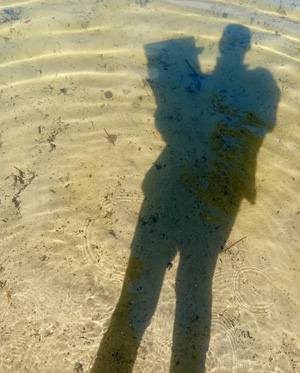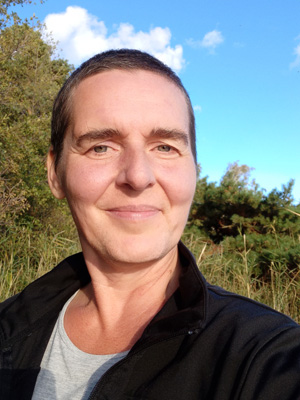
Jobs extended

There are some pre-student jobs, I’m happy to forget, though I enjoyed working as a waiter in the Berlin Irish Pubs.
Still a student, I took a look at the theatre world and brought the mask theatre company Familie Floez to the Edinburgh Festival Fringe in 2001. That is to say, I told them: You have to go! And they said: OK.
The trouble with my thesis about globalisation and free trade was that it decided me against seeking a career in business. I just didn’t want any part in that circus. If anything I wanted to develop alternatives.
After graduation, my zigzagging began. I did some uninspiring business jobs to earn money and wrote a book that dealt with my religious time. It’s not bad. But I’m glad it never got published. I wasn’t ready.
I worked with Flöz again when they did the Volkstheaterfestival in Berlin and we went back to the Fringe in 2004.
In 2005 I got a job as script continuity for a TV series, I luckily hadn’t seen before or I might have declined politely. I nonetheless returned for a second time in 2006.
Also in 2006, I was part of the team at the DPG Deutsche Pfandsystem GmbH who launched the bottle and can recycling system.
The same year, I did a documentary of a mural, as a test for my new camera and as a favour to the artist, Marlene Jachmann. The documentary was shown in the artist’s gallery Eiswürfel and later that year in the Haus am Lützowplatz.
In 2007 I stood in for another script continuity at a different series, and I worked as a second assistant director on the movie U900, which had the biggest film budget in Germany that year. We filmed in Munich, on Malta and in Rome. Working on Malta was great, but my highlight was that first time we drove through the gates of Cinecittà in Rome, knowing that directors like Fellini had worked in these studios. I had goosebumps.
If there is one advice I can give from my time as second assistant director, then it is this: don’t work on a big production if you have never done it before. I am an expert in doing things for the first time. But on a set, you need at least a minimum of routine.
If there is one thing I hope for for Visionary Meddlers, my project’s film producer, then it is that only people who are actually interested in telling stories with the medium of film, will be part of the team.
I was very disappointed about my time in the film world. I love film, and I had been looking forward to working with other film lovers. But that was not the reality. Too many people wanted a cool sounding job, it seemed, or just did a job, mostly not particularly well.
I was not motivated to stick around for more disappointment. Instead I hoped, and to some extent still do, that one day, I would have enough money to make movies with the sort of people who are as passionate about film as I was and might be again.
And so I began zigzagging again, trying again to find an easy road to making money fast. It’s such an old silly motivation, and I am angry with myself that I kept falling for it.
2008/9 I wrote another book, gave my autodidact quite a bit to study, and polished my editing skills. But nothing really stuck.
In 2010, photography took centre stage after I had been given a professional camera — and with it a new kind of hope. Working as a photographer would be much less frustrating than working on a filmset, and if I could make money from it, then it would at least be with something I could get behind. Plus photography allowed me to tell stories and make the unseen seen.
Talking mistakes, there were two big ones here. I like photography. I am very good at it. But it was nonetheless just a means to an end. I had no intention to fully commit to photography. The second mistake was that I did it all on my own, even the big shoots at the hospitals and the days and nights afterwards of processing thousands of images. If you want to go into commercial photography, find a team. There will be less money for you, but a lot more health, happiness and potentially even more quality.
2012 was a turning point year in many respects. I had a breakdown, not unlike the one in 2023, after years of overwork. But 2012 was insofar different as that I knew a lot less. It was only in that spring that I began to grasp how damaging much of my first thirty years had been. I was thirty nine. And it is only this year, 2024, that I’ve made big leaps in healing, a lot in connection with bodywork (strength training, Vinyasa yoga, breathing, cold showers, floating in a lake, being in the moment).
Honestly, I know that for many therapy is still not a welcome option. But allow me to pass on what finally got me to seek help. I was a guest in someone else’s group therapy session, and the therapist said to someone else: ‘Grant yourself a therapy.’
I truly wish I had known decades sooner how much healing I need, and I wish I had started that journey a long time ago. Also, by now, I am certain that personal healing is key to re-shaping our world.
2012 was also the year in which the idea for the initial easy town project materialised. In the middle of my crisis, I got the call that my friend Easy was in hospital, a ruptured aneurysm. You can find more about this on the easy town books website: How it all began, the origins of the easy town idea.
Some months later, I began to do short basic animated videos and wrote texts for business clients, and at the end of 2012, I was sort of nudged into web design and liked it. I had already designed a website on paper, but now I taught myself how to do the actual building.
Today, I think, I wasted a lot of time by zigzagged through jobs and by trying to learn and do everything on my own. I didn’t attempt to build networks, let alone ask anyone for advice. Independence and also an unhelpful need to always be strong, has lost me more time and opportunities than I like to admit.
Mind you, an independent mind is something to treasure. But I guess, I took my independence to unnecessary extremes.
On the positive, at the time, I built a small company for web design and photography. I loved the work. I am good at it. But I was not interested in it.
I wanted to do my bit for our societies and our planet. I wanted to rethink whatever might need a rethink. I wanted to develop the easy town ideas. Instead I exhausted myself by doing anything but focusing on what I am actually best at: stories, inventions, questions, thinking, creating.
As I worked more again in 2013, I fell back into ignoring what my body and soul needed: nurturing and healing. I remember getting very angry with myself in August 2023 when I read the draft for book 3, shaping, just days after my cancer diagnosis. It’s all in there. I knew what my body and soul needed. I wrote about. But I didn’t heed my own words.
Back to the past. 2013/14 where not easy, but in 2015 I eventually had a group of clients I liked working with, among them a hospital for which I designed the website and did many photo shoots.
2016 was another key year. It was the year, when I tested a new idea for the easy town project and ended up with a story I still love. About a week later, I decided to write the story and in the process of writing, the ideas for easy town have grown considerably. One of the things, I treasure most about the story is its easily accessible complexity, and for me it is a playground where I can test pretty much every idea. The original story, which I did in a period of six weeks, is like the skeleton for the book version. The book version keeps surprising me with the extent of depth it occasionally achieves.
I started writing the easy town story on 10 August 2016. In autumn, I got a second big hospital contract and subsequently, I only made notes for the books in the first half of 2017. Starting in late summer, I spent the following five months transcribing notes and extending them for all twelve books of the series. This included a number of calculations and long lists for things like kinds of homes, gardens, tourist places, names — and more.
2018 is a blur with a lot of website work as well as losing a number of clients (three retirements and a new boss at the hospitals). In late summer 2018, I needed something to cheer me up and pushed myself to complete book 1, beginning. Too early. When I re-read it in spring 2020, I kept blushing throughout much of the first third of the book. Much of the later bits were good.
And here is a strange conundrum and maybe an advice to aspiring writers. Writing book 2, travelling, was essential for me to become the writer I am. And it was only with this knowledge and experience that I was ready to rewrite parts of book 1, beginning.
Anyway, in autumn 2019, I finally decided to focus on the easy town books, after I had found sponsor. While this was liberating, it didn’t keep me from continuing to exhaust myself.
Covid saw my sponsor withdraw while I was very sick, probably with Covid. It was early March when I fell sick, no one seemed to know anything anyway, and I thought, if this isn’t Covid, then I can’t risk getting that on top. It took me ten weeks to get out of this.
The good thing about this period was that it slowed me down considerably and my writing profited a lot from that, because instead of pushing forward, I began to dig deeper, and because I was so slow, I noticed a lot more.
I don’t know how I managed to get to the end of 2020 financially. I borrowed a bit, but still. By the end of November, I gave in and applied for the basic income scheme. I struggled with my health well into summer 2021, and it makes me angry, today, that despite these struggles, it still took the big body strike in 2023, to make me listen and to finally accept that my body matters.
In summer 2021, I picked up my artistic photographic work again in support of the easy town projects, and I completed both parts of book 2, travelling. 2022 onward have their own chapter on the main about the author page.